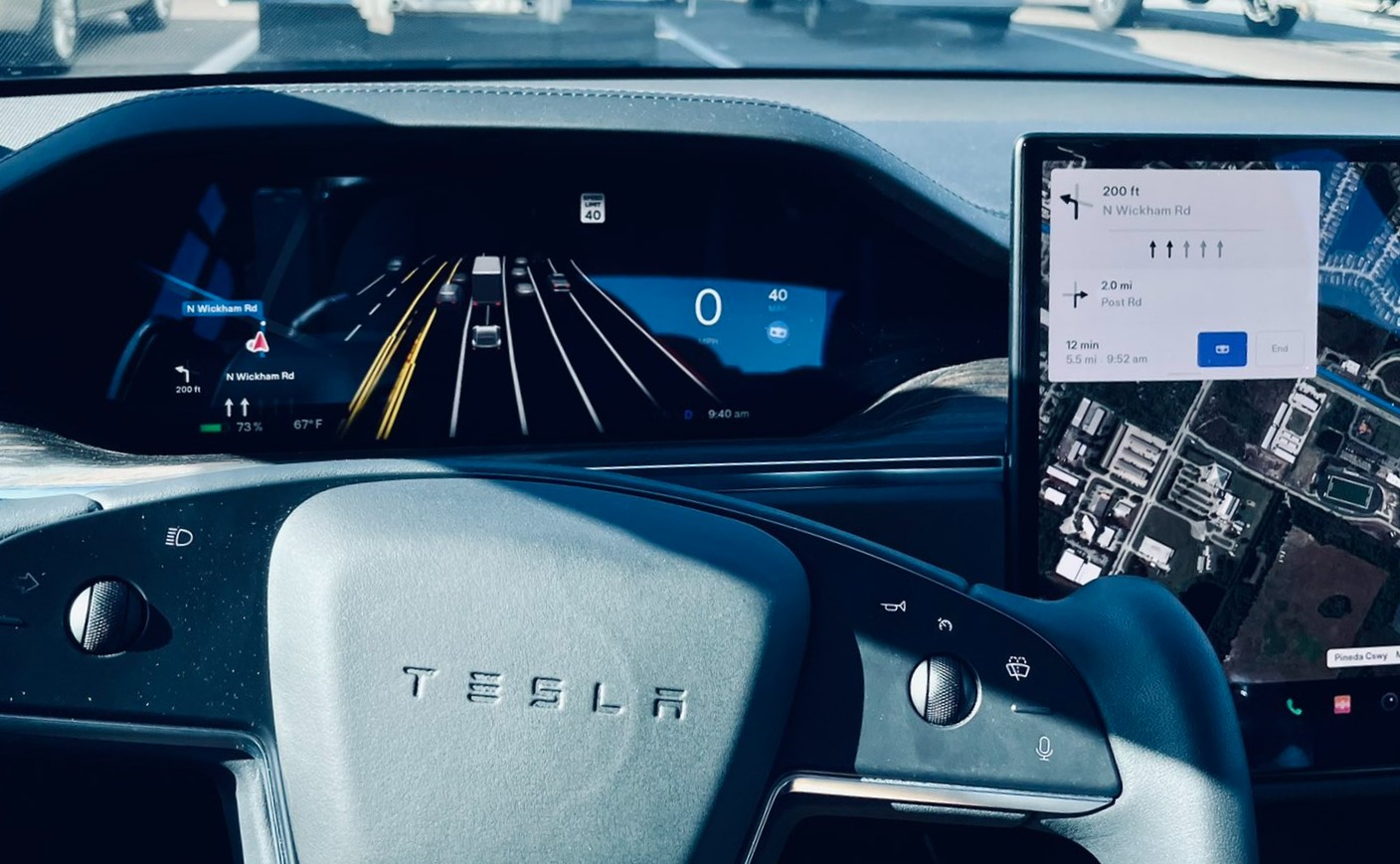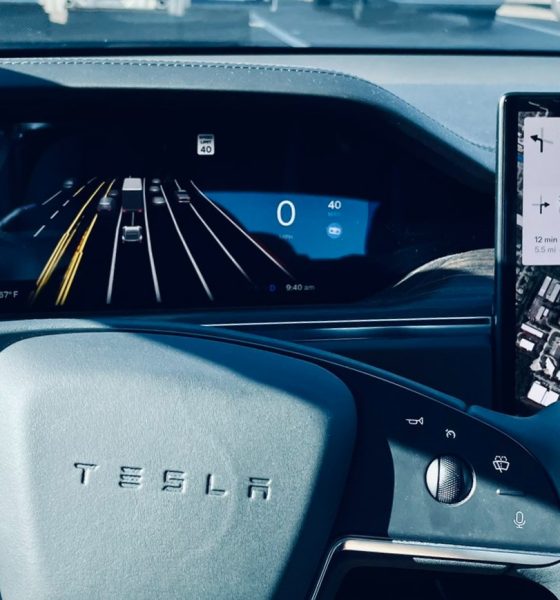

News
Tesla starts disabling FSD Beta’s “rolling stop” feature with V10.10 update
Just as indicated in the National Highway Traffic Safety Administration’s (NHTSA) Safety Recall Report, Tesla has started rolling out an over-the-air software update that removes FSD Beta’s ability to perform “rolling stops.” The function was deemed by the NHTSA as a driving behavior that may increase the risk of collisions.
Images of FSD Beta 10.10’s release notes were recently shared online, hinting that the company is now actively addressing the issue outlined in the recent recall. It remains to be seen how long it would take Tesla to update its FSD Beta fleet to the new v10.10 software, especially since there are now nearly 60,000 drivers who are part of the early access program.
Following are the release notes of FSD Beta 10.10.
Early Access Program – FSD Beta 10.10
– Smoother fork maneuvers and turn-lane selection using high fidelity trajectory primitives.
– Disabled rolling-stop functionality in all FSD Profiles. This behavior used to allow the vehicle to roll through all-way-stop intersections, but only when several conditions were met, including: vehicle speed less than 5.6 mph, no relevant objects/pedestrians/bicyclists detected, sufficient visibility and all entering roads at the intersection have speed limits below 30 mph.
– Improved generalized static object network by 4% using improved ground truth trajectories.
– Improved smoothness when stopping for crossing objects at intersections by modeling soft and hard constraints to better represent urgency of the slowdown.
– Enabled lane changing into an oncoming lane to maneuver around static obstacles, when safe to do so.
– Improved smoothness for merge handling by enforcing more consistency with previous cycle’s speed control decisions.
– Improved handling of flashing red light traffic controls by adding more caution for events where crossing vehicles may not stop.
– Improved right of way understanding at intersections with better modeling of intersection extents.
A look at FSD Beta 10.10’s release notes suggests that Tesla’s “rolling stop” feature was not really as aggressive or dangerous as initially feared by critics. As noted by the company, FSD Beta’s “rolling stops” are only enabled when several conditions are met, and those conditions are fairly conservative. Tesla’s FSD Beta safety record would support this thesis, as the company noted in the NHTSA’s Safety Recall Report that it was not aware or any warranty claims, field reports, crashes, injuries, or fatalities that resulted from the advanced driver-assist system’s “rolling stop” function. “As of January 27, 2022, Tesla is not aware of any warranty claims, field reports, crashes, injuries or fatalities related to this condition,” the NHTSA’s report read.
While the removal of FSD Beta’s “rolling stop” feature was considered a recall of over 53,000 Teslas, the fact remains that the issue was completely addressed through a simple over-the-air update. Owners whose vehicles were part of the recall were also not required to do anything specific except to ensure that their vehicles were connected to the internet. This was something that was highlighted in the remedy for the issue indicated in the NHTSA’s Safety Recall Report.
“Tesla will disable the ‘rolling stop’ functionality on affected vehicles, starting with firmware release 2021.44.30.15. Firmware release 2021.44.30.15 is expected to begin deployment OTA to affected vehicles in early February 2022. The disablement will carry forward in firmware release 2021.44.30.15 and later releases. No further action is necessary from owners who install firmware release 2021.44.30.15 or a later release on their vehicles,” the NHTSA’s Safety Recall Report read.
Don’t hesitate to contact us with news tips. Just send a message to simon@teslarati.com to give us a heads up.

News
Tesla ships out an update for everyone that California caused
“This change only updates the name of certain features and text in your vehicle,” the company wrote in Release Notes for the update, “and does not change the way your features behave.”

Tesla has shipped out an update for its vehicles that was caused specifically by a California lawsuit that threatened the company’s ability to sell cars because of how it named its driver assistance suite.
Tesla shipped out Software Update 2026.2.9 starting last week; we received it already, and it only brings a few minor changes, mostly related to how things are referenced.
“This change only updates the name of certain features and text in your vehicle,” the company wrote in Release Notes for the update, “and does not change the way your features behave.”
The following changes came to Tesla vehicles in the update:
- Navigate on Autopilot has now been renamed to Navigate on Autosteer
- FSD Computer has been renamed to AI Computer
Tesla faced a 30-day sales suspension in California after the state’s Department of Motor Vehicles stated the company had to come into compliance regarding the marketing of its automated driving features.
The agency confirmed on February 18 that it had taken a “corrective action” to resolve the issue. That corrective action was renaming certain parts of its ADAS.
Tesla discontinued its standalone Autopilot offering in January and ramped up the marketing of Full Self-Driving Supervised. Tesla had said on X that the issue with naming “was a ‘consumer protection’ order about the use of the term ‘Autopilot’ in a case where not one single customer came forward to say there’s a problem.”
This was a “consumer protection” order about the use of the term “Autopilot” in a case where not one single customer came forward to say there’s a problem.
Sales in California will continue uninterrupted.
— Tesla North America (@tesla_na) December 17, 2025
It is now compliant with the wishes of the California DMV, and we’re all dealing with it now.
This was the first primary dispute over the terminology of Full Self-Driving, but it has undergone some scrutiny at the federal level, as some government officials have claimed the suite has “deceptive” names. Previous Transportation Secretary Pete Buttigieg was one of those federal-level employees who had an issue with the names “Autopilot” and “Full Self-Driving.”
Tesla sued the California DMV over the ruling last week.
News
Tesla workers push back against Giga Berlin unionization
“IG Metall did not succeed in Giga Berlin‘s works council election earlier today. The union share was reduced from nearly 40% in 2024 to 31% in 2026! This is a clear message by the Giga Berlin team towards an independent co-determination! The list called Giga United, led by the current chairwoman, Michaela Schmitz, received the most votes with more than 40%! Good news for Giga Berlin!”

Tesla workers pushed back against unionization efforts at Gigafactory Berlin, and over the past few years, there has been a dramatic decrease in interest to unionize at the German plant.
Gigafactory Berlin Plant Manager André Thierig announced on Wednesday that IG Metall, the European union group, saw its share reduce from 40 to 31 percent in 2026 as employees eligible to vote on the issue. Instead, the Giga Berlin team, known as Giga United, received the most votes with more than 40 percent.
BREAKING! 🚨
IG Metall did not succeed in Giga Berlin‘s works council election earlier today. The union share was reduced from nearly 40% in 2024 to 31% in 2026!
This is a clear message by theGiga Berlin team towards an independent co-determination!
The list called Giga…
— André Thierig (@AndrThie) March 4, 2026
Thierig gave specific details in a post on X:
“IG Metall did not succeed in Giga Berlin‘s works council election earlier today. The union share was reduced from nearly 40% in 2024 to 31% in 2026! This is a clear message by the Giga Berlin team towards an independent co-determination! The list called Giga United, led by the current chairwoman, Michaela Schmitz, received the most votes with more than 40%! Good news for Giga Berlin!”
There were over 10,700 total employees who were eligible to vote, with 87 percent of them turning out to cast what they wanted. There were three key outcomes: Giga United, IG Metall, and other notable groups, with the most popular being the Polish Initiative.
The 37-seat council remains dominated by non-unionized representatives, preserving Giga Berlin as Germany’s only major auto plant without a collective bargaining agreement.
Thierig and Tesla framed the outcome as employee support for an “independent, flexible, and unbureaucratic” future, enabling acceleration on projects like potential expansions or new models. IG Metall expressed disappointment, accusing management of intimidation tactics and an “unfair” campaign.
The first election of this nature happened back in 2022. In 2024, IG Metall emerged as the largest single faction with 39.4 percent, but non-union lists coalesced for a majority.
But this year was different. There was some extra tension at Giga Berlin this year, as just two weeks ago, an IG Metall rep was accused by Tesla of secretly recording a council meeting. The group countersued for defamation.
Tesla Giga Berlin plant manager faces defamation probe after IG Metall union complaint
This result from the 2026 vote reinforced Tesla’s model of direct employee-management alignment over traditional German union structures, amid ongoing debates about working conditions. IG Metall views it as a setback but continues advocacy. Tesla sees it as validation of its approach in a competitive EV market.
This outcome may influence future labor dynamics at Giga Berlin, including any revival of expansion plans or product lines, which Musk has talked about recently.
News
SpaceX President Gwynne Shotwell details xAI power pledge at White House event
The commitment was announced during an event with United States President Donald Trump.

SpaceX President Gwynne Shotwell stated that xAI will develop 1.2 gigawatts of power at its Memphis-area AI supercomputer site as part of the White House’s new “Ratepayer Protection Pledge.”
The commitment was announced during an event with United States President Donald Trump.
During the White House event, Shotwell stated that xAI’s AI data center near Memphis would include a major energy installation designed to support the facility’s power needs.
“As you know, xAI builds huge supercomputers and data centers and we build them fast. Currently, we’re building one on the Tennessee-Mississippi state line. As part of today’s commitment, we will take extensive additional steps to continue to reduce the costs of electricity for our neighbors…
“xAI will therefore commit to develop 1.2 GW of power as our supercomputer’s primary power source. That will be for every additional data center as well. We will expand what is already the largest global Megapack power installation in the world,” Shotwell said.
She added that the system would provide significant backup power capacity.
“The installation will provide enough backup power to power the city of Memphis, and more than sufficient energy to power the town of Southaven, Mississippi where the data center resides. We will build new substations and invest in electrical infrastructure to provide stability to the area’s grid.”
Shotwell also noted that xAI will be supporting the area’s water supply as well.
“We haven’t talked about it yet, but this is actually quite important. We will build state-of-the-art water recycling plants that will protect approximately 4.7 billion gallons of water from the Memphis aquifer each year. And we will employ thousands of American workers from around the city of Memphis on both sides of the TN-MS border,” she noted.
The Ratepayer Protection Pledge was introduced as part of the federal government’s effort to address concerns about rising electricity costs tied to large AI data centers, as noted in an Insider report. Under the agreement, companies developing major AI infrastructure projects committed to covering their own power generation needs and avoiding additional costs for local ratepayers.








